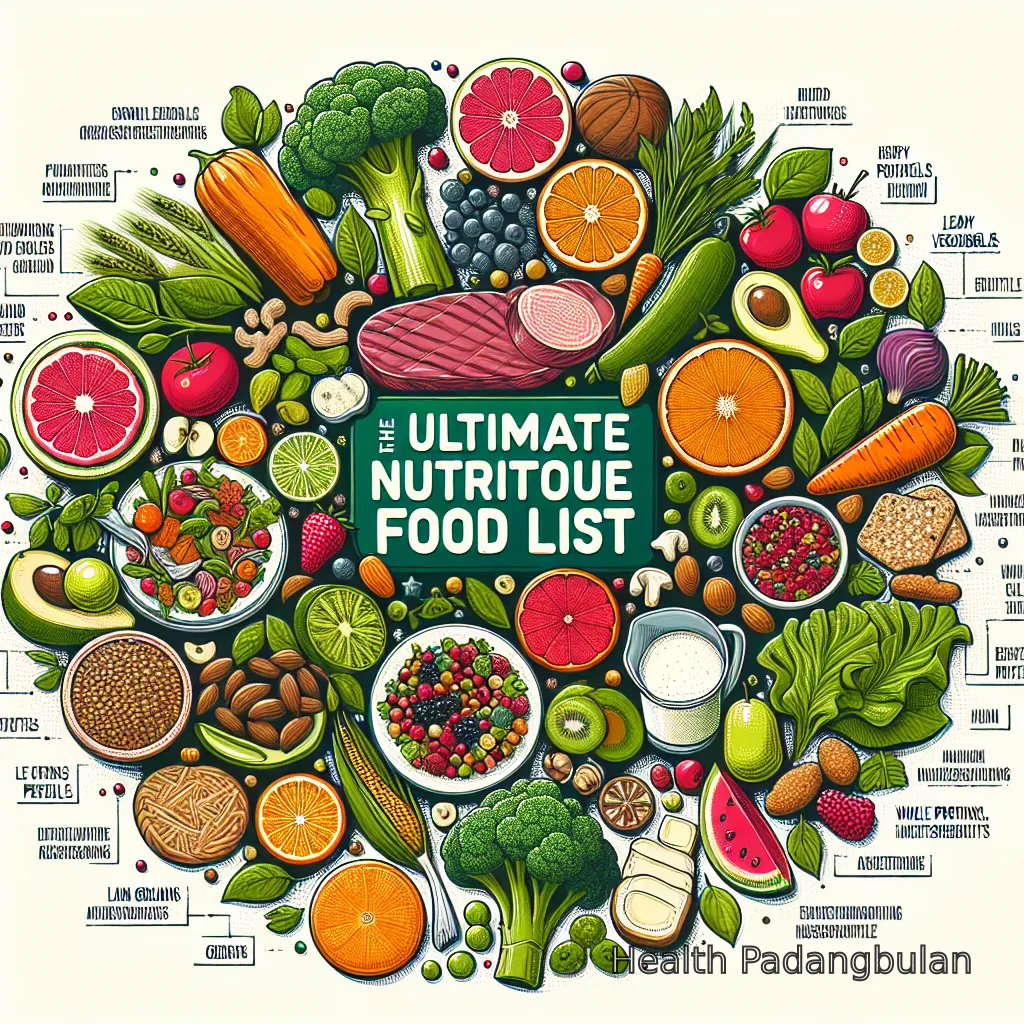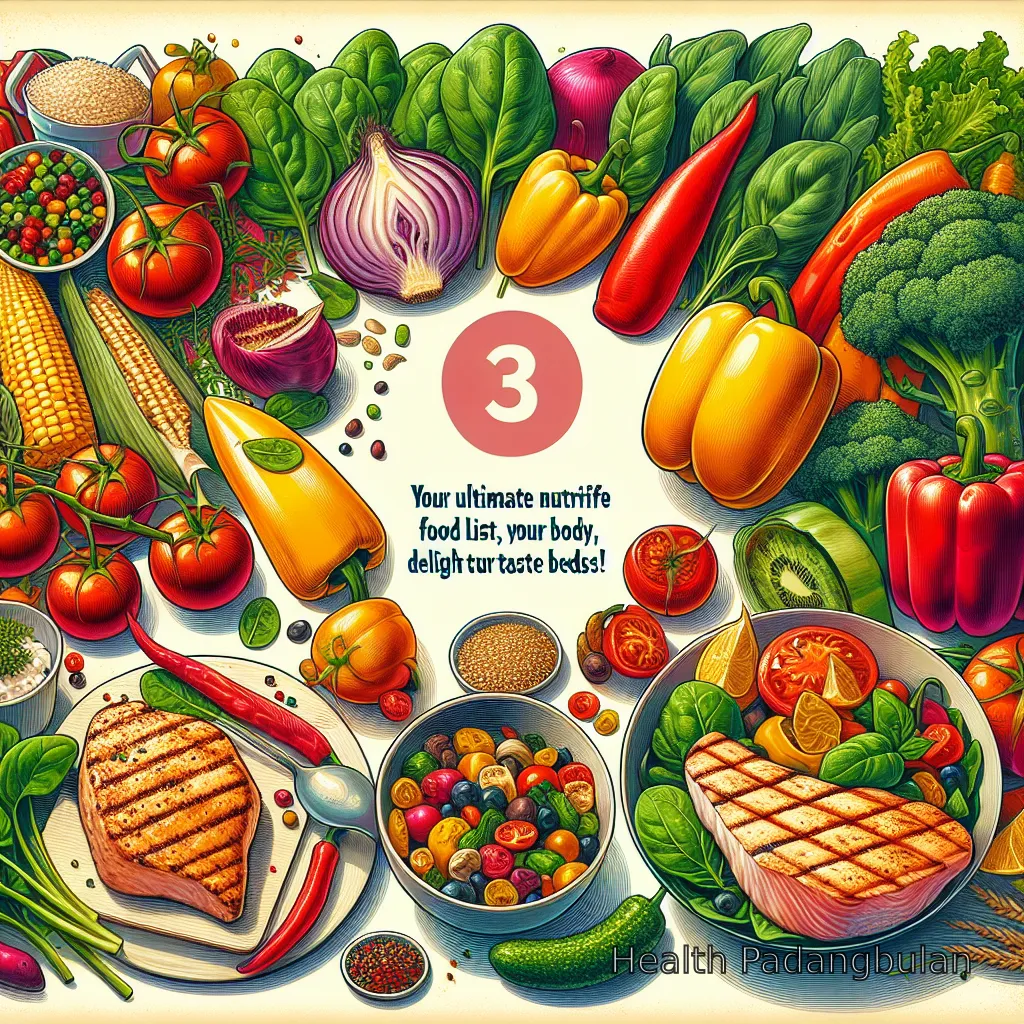Ever feel lost in the maze of dietary advice? One day, everyone’s raving about kale; the next, it’s all about avocados. It can be exhausting trying to figure out what truly constitutes ‘healthy eating.’ But what if I told you that eating nutritiously doesn’t have to be complicated, restrictive, or bland?
Welcome to your straightforward guide – a carefully curated **nutritious food list** designed to cut through the noise and empower you with simple, delicious choices. This isn’t about deprivation; it’s about abundance, about discovering the amazing foods that not only taste great but also provide your body with the essential building blocks it needs to thrive. Think of this as your friendly roadmap to feeling fantastic, bursting with energy, and supporting your long-term health. Ready to dive into a world where good-for-you food is also incredibly good?
Why Building Your Plate with Nutritious Foods Matters (More Than You Think!)

Before we unveil our star-studded **nutritious food list**, let’s quickly chat about *why* this matters. We often hear ‘eat healthy,’ but do we really internalize the profound impact food has on every aspect of our lives?
Read also : Healthy Eating Tips
Imagine your body as a high-performance sports car. Would you fill it with cheap, watered-down fuel, or would you opt for the premium, high-octane stuff? The answer is obvious! Our bodies are far more complex and precious than any car, and the ‘fuel’ we put into them directly affects how well they perform, how long they last, and how good we feel doing it.
Nutritious foods are packed with vitamins, minerals, antioxidants, fiber, and healthy fats – these are the tiny superheroes that support everything from your immune system and brain function to your mood and energy levels. They help protect against chronic diseases, keep your skin glowing, and even influence how well you sleep. Choosing nutrient-dense options isn’t just about weight management; it’s about investing in your vitality, your mental clarity, and your overall quality of life. It’s truly about giving your future self a high-five every single day.
Read also : micronutrients explained
The Ultimate Nutritious Food List: Your Daily Dose of Delicious Goodness
Alright, drumroll please! Let’s get to the good stuff. This list isn’t exhaustive, but it highlights some of the most accessible, versatile, and nutrient-packed foods you can easily incorporate into your daily routine. Think of these as your go-to superstars.
1. Nature’s Candy: Fruits
Sweet, juicy, and incredibly diverse, fruits are nature’s perfect snack. They’re loaded with vitamins, minerals, fiber, and powerful antioxidants that fight inflammation and protect your cells. And guess what? There’s no need to fear their natural sugars when they come bundled with so many other benefits!
- **Berries (Blueberries, Raspberries, Strawberries):** Antioxidant powerhouses that support brain health and reduce inflammation. Toss them in yogurt, oatmeal, or enjoy them by the handful.
- **Apples:** ‘An apple a day…’ really does hold some truth! High in fiber, especially pectin, which is great for gut health. Crunch them raw or slice them into salads.
- **Citrus Fruits (Oranges, Grapefruits, Lemons):** Bursting with Vitamin C, essential for immune function and skin health. Start your day with a squeeze of lemon in water!
- **Bananas:** A fantastic source of potassium, crucial for blood pressure and muscle function. Great for pre- or post-workout fuel.
- **Avocados:** (Yes, botanically a fruit!) While we’ll cover healthy fats below, avocados deserve a mention here for their unique nutrient profile, including healthy monounsaturated fats, fiber, and potassium.
2. The Green (and Colorful) Giants: Vegetables

If fruits are nature’s candy, vegetables are nature’s multi-vitamins. They offer an incredible array of nutrients with very few calories, making them perfect for filling up your plate. The key here is variety – eat the rainbow!
- **Leafy Greens (Spinach, Kale, Swiss Chard):** These dark, leafy heroes are rich in vitamins K, A, and C, as well as folate and various minerals. Think of them as your daily dose of cellular protection. Add them to smoothies, stir-fries, or as a base for salads.
- **Cruciferous Vegetables (Broccoli, Cauliflower, Brussels Sprouts):** Known for their potential cancer-fighting compounds, plus fiber and Vitamin C. Roast them until tender-crisp for maximum flavor.
- **Bell Peppers:** Vibrant and versatile, packed with Vitamin C and antioxidants. Great raw with hummus or sautéed in almost any dish.
- **Carrots:** Famous for beta-carotene (a precursor to Vitamin A), which is vital for vision and skin health. Enjoy them raw or roasted.
- **Sweet Potatoes:** A complex carbohydrate that provides sustained energy, plus Vitamin A and fiber. A healthier alternative to white potatoes.
3. Your Body’s Fuel Source: Whole Grains
Forget the ‘carbs are bad’ myth! The right kind of carbs – whole grains – are vital for sustained energy, gut health, and satiety. They contain the entire grain kernel, meaning they’re packed with fiber, B vitamins, and minerals that are often stripped from refined grains.
- **Oats:** A fantastic breakfast staple, rich in soluble fiber (beta-glucan), which can help lower cholesterol and stabilize blood sugar. Enjoy as oatmeal or overnight oats.
- **Quinoa:** A complete protein (meaning it contains all nine essential amino acids), making it a great plant-based option. Also high in fiber and various minerals. Use as a rice substitute or in salads.
- **Brown Rice:** A good source of fiber, magnesium, and selenium. A wholesome side dish for many meals.
- **Whole Wheat Bread/Pasta:** When choosing bread or pasta, opt for ‘100% whole wheat’ to ensure you’re getting the full nutritional benefits.
4. Building Blocks of Life: Lean Proteins
Protein is crucial for building and repairing tissues, making enzymes and hormones, and keeping you feeling full and satisfied. Don’t underestimate its power!
- **Chicken Breast/Turkey:** Lean, versatile sources of high-quality protein. Great for grilling, baking, or shredding into salads.
- **Fish (Salmon, Tuna, Cod):** Especially fatty fish like salmon, which are rich in Omega-3 fatty acids – superstars for heart and brain health. Aim for at least two servings per week. For more on the specific nutrients, you can delve into [micronutrients explained].
- **Eggs:** Often called nature’s perfect food, eggs are a complete protein source, offering essential amino acids and a host of vitamins and minerals. And yes, the yolk is where many of the nutrients reside!
- **Legumes (Beans, Lentils, Chickpeas):** (Also under plant-based below) These are phenomenal plant-based protein sources, also rich in fiber and various minerals.
- **Tofu/Tempeh/Edamame:** Excellent plant-based protein options, especially for vegetarians and vegans.
5. Don’t Fear the Fat! Healthy Fats
For years, fat got a bad rap, but we now know that *healthy* fats are absolutely essential for hormone production, nutrient absorption, brain health, and even keeping your skin supple. Just remember, moderation is key, as they are calorie-dense.
- **Avocados:** We mentioned them already, but their monounsaturated fats are fantastic for heart health.
- **Nuts (Almonds, Walnuts, Pecans):** Great sources of healthy fats, protein, and fiber. Just a small handful can be a satisfying snack. Walnuts are particularly high in Omega-3s.
- **Seeds (Chia Seeds, Flax Seeds, Hemp Seeds):** Tiny but mighty! Packed with Omega-3s, fiber, and protein. Sprinkle them on yogurt, oatmeal, or salads.
- **Olive Oil:** A staple of the Mediterranean diet, extra virgin olive oil is rich in monounsaturated fats and antioxidants. Use for dressings or low-heat cooking.
Beyond the List: Making Nutritious Eating a Lifestyle
Having a **nutritious food list** is a fantastic start, but integrating it into your daily life is where the magic truly happens. It’s not about being perfect, but about making consistent, small choices that add up over time.
- **Start Small:** Don’t overhaul your entire pantry overnight. Pick one or two new foods from this list each week and find ways to enjoy them. Maybe swap your regular toast for whole-wheat, or add a handful of spinach to your eggs.
- **Plan Ahead:** A little meal planning goes a long way. When you know what you’re going to eat, you’re less likely to make impulsive, less nutritious choices. Prep some veggies, cook a batch of quinoa, or have fruit readily available.
- **Mindful Eating:** Pay attention to your hunger and fullness cues. Savor your food. When you eat mindfully, you often enjoy your meals more and consume fewer calories. For more practical advice on integrating these changes, check out our [Healthy Eating Tips] article.
- **Hydrate:** Don’t forget water! It’s not a food, but proper hydration is fundamental to overall health and nutrient absorption. Sometimes, what feels like hunger is actually thirst.
Remember, your journey to better health is a marathon, not a sprint. Celebrate small victories, be kind to yourself, and enjoy the delicious process of nourishing your body!
Conclusion
There you have it – a comprehensive yet accessible **nutritious food list** to help you embark on, or continue, your journey to better health. From vibrant fruits and crunchy vegetables to wholesome grains and lean proteins, these foods are more than just sustenance; they are the building blocks for a life filled with energy, vitality, and joy.
So, what are you waiting for? Take this list, head to your kitchen or local grocery store, and start experimenting! Your taste buds will thank you, your body will thank you, and most importantly, your future self will thank you for making choices that truly nourish from the inside out. Happy healthy eating!
References
FAQ
What are the most nutritious foods I should be eating daily?
While ‘most nutritious’ can vary, a strong daily foundation includes leafy greens (spinach, kale), berries, whole grains (oats, quinoa), lean proteins (chicken, fish, legumes), and healthy fats (avocado, nuts, olive oil). Aim for a colorful variety to get a broad spectrum of nutrients.
How can I easily incorporate more nutritious foods into my diet?
Start small! Add a handful of spinach to your smoothie, swap white rice for brown, snack on an apple instead of chips, or throw some berries into your yogurt. Meal prepping and keeping healthy options visible and accessible in your kitchen can also make a big difference.
Are ‘superfoods’ real, and should I focus on them?
The term ‘superfood’ is often a marketing term, but it usually refers to foods exceptionally rich in nutrients and health benefits (like berries, kale, salmon, and avocado). While they are great to include, the most important thing is an overall balanced diet with a variety of whole, unprocessed foods, rather than fixating on just a few ‘super’ items.
What’s the difference between healthy and unhealthy fats?
Healthy fats, like monounsaturated and polyunsaturated fats (found in avocados, nuts, seeds, olive oil, fatty fish), are crucial for heart health, brain function, and nutrient absorption. Unhealthy fats, primarily trans fats (often in processed foods) and excessive saturated fats, can raise bad cholesterol and increase disease risk. Focus on incorporating healthy fats in moderation.
Do I need to eat organic to be healthy?
Eating organic can reduce exposure to pesticides and sometimes offer slightly higher nutrient levels, but it’s not strictly necessary for a healthy diet. The most significant health benefits come from consistently eating a wide variety of fruits, vegetables, whole grains, and lean proteins, whether they are organic or conventionally grown. If budget is a concern, prioritize organic for items on the ‘Dirty Dozen’ list.
How much protein do I really need in a day?
Protein needs vary based on age, activity level, and health goals. A general guideline is around 0.8 grams of protein per kilogram of body weight per day (e.g., a 70kg person would need about 56g). Active individuals or those building muscle may need more. Spreading protein intake throughout the day is also beneficial.